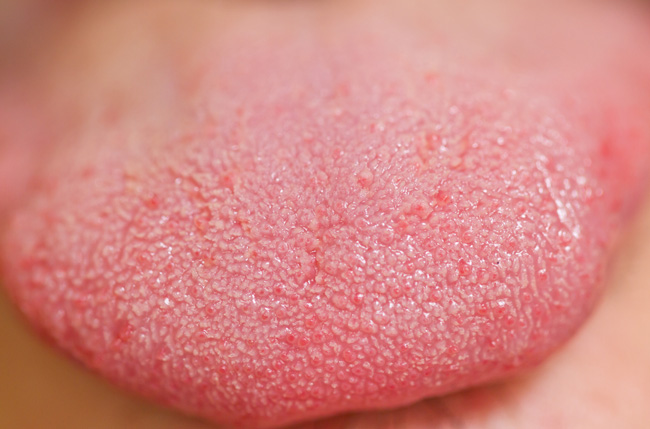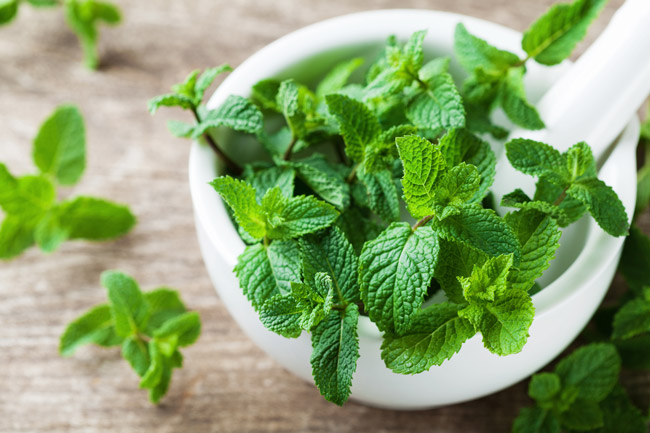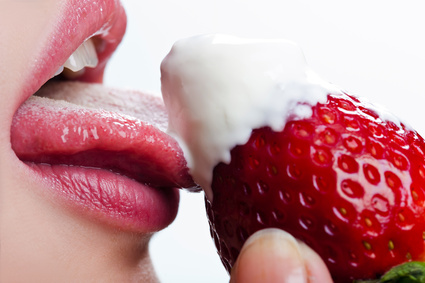
Have you ever been been vaping your favourite flavour, and suddenly noticed you don’t like it any more?
Or, even worse, found you can’t taste anything or that your tongue is a bit numb?
Then, my friend, you have the dreaded vaper’s tongue.
First, don’t panic, as it is usually NOT serious and NOT permanent.
In this article you’ll find out what causes vaper’s tongue and what to do about it.
What Is Vaper’s Tongue?
The term vaper’s tongue (also known as vaper’s fatigue) is used to cover a wide range of taste related ailments from going off a single individual flavour that you used to like to losing taste for all foods and drinks.
While the first example is far more common, guidance from guidance from MedicineNet tells us the second example is potentially more serious, with causes including dehydration, vitamin deficiency or illness.
In most cases, though, the condition is temporary and soon resolves itself (although, as we shall see, there are quite a few things you can do to speed up the return of your tastes buds!)
How Taste Works

Your tongue will be covered with anything from 2000 to 8000 taste buds (or, if you want to get fancy, gustatory calyculi). If you are at the upper end of the scale 10,000 taste buds you’ll be known as a super taster, and can confidently consider a career in tea, wine tasting - or e-juice reviewing!
The difference in people’s taste buds might also explain why some people preferred steeped e-liquid and other people find it hard to tell the difference.
These cells in your taste buds are on a constant cycle, dying away and then regrowing. This cycle can take anything from 10 days to 2 weeks.
Your taste buds are primed to test five different tastes:
- sweetness
- sourness
- saltiness
- bitterness
- umami (a savoury taste)
Don’t Underestimate Your Nose!
Despite the thousands of taste buds that coat our tongue, smell plays an important part in our taste buds.
Messages from your nose combine with taste to create the flavour you enjoy when you eat, drink or vape.
In fact, researchers in one study asked tea tasters to block their noses. The tea tasters, renowned for their sense of taste, were shocked to discover that when they couldn’t smell, they were unable to distinguish between different teas.
You can find the effects of this yourself. Take a drink of tea or juice, and then repeat the action while holding your nose. You should find that you taste less when you hold your nose.
(You can do this with vaping, too, but be careful as it can make you cough.)
The Psychology of Taste and Smell
Intriguingly, tastes are not set in stone. It’s well known that tastes change as you get older, but there are a variety of factors that can change taste, including tasting something just before you get ill and seeing popular people enjoy a taste you didn’t previously like. Your taste can also be impacted by expectations, as the following experiments showed:
The Pepsi/Coke Experiment

In one blind test, researchers gave people pepsi and coca-cola to drink. A majority of people preferred the taste of pepsi. But when researchers told people the name of the drink, people preferred coke by a margin of 4:1.
Something Minty

In another experiment, TV presenter Derren Brown opened a bottle of mint and told his audience that many of them might be able to smell it.
After many of the audience did smell the mint, he admitted that there was in fact no minty smell and the smell had been caused by a low frequency sound.
He then told his TV audience to turn up the volume and expect the sound to trigger the taste, and tweet the hashtag #derrensmells.
Only after many people claimed to smell the minty smell did Derren then drop the bombshell that there had been no sound - the minty smell had been created purely by expectations.
That raises intriguing questions for vapers. Does that e-liquid that you got from a boutique e-liquid house taste so great because it is great, because of ramped up expectations, or even because of the fancy packaging?
And could you go off a favourite taste for psychological rather than medical reasons?
(We have tried this in our factory. First we told one of our mixology team how great a flavour was, before giving it to him to try. We then told him there was another one we were disappointed with, but that we'd like him to try it anyway.
Little did the taster know that it was the same e-liquid.
The taster behaved as predicted, giving higher marks to the first e-liquid. )
10 Possible Causes Of Vaper’s Tongue
1. Vaping the same flavour for too long
This is probably the least scientific of the reasons here (on the basis I can’t find any research to back it up), but I’ve noticed that myself and other vapers frequently get vaper’s tongue after we have been vaping the same flavour for too long.
2. Damaged taste buds
Unfortunately, taste buds can get damaged and could lead to vaper's tongue. Causes include smoking, infections, alcohol, extremely sour foods, spicy foods and some medications. Fortunately, taste buds heal themselves, although they do get weaker as you get older (which is one reason your tastes change so much in the transition from childhood to adulthood.)As we’ve seen, it can take up to two weeks for taste buds to regrow, so it could be a little time before you fully regain your sense of taste.
3. Recently switched from smoking
I’m mentioning this cause for the sake of completeness. Often mentioned on other blog posts on vaper’s tongue, but I’m a little sceptical that this could cause your vaper’s tongue unless you are a dual user (both vape and smoke).
Yes, smoking can damage taste and smell (fortunately it’s not permanent). In fact, many vapers have reported coming down in the morning a couple of weeks after their last cigarette and being hit by the fresh smell of coffee brewing.
(That’s the positive experience - other vapers have been hit by less pleasant smells!)
However, vaper’s tongue refers to suddenly losing your sense of taste, so unless you have just started smoking, it’s not likely to be a cause.
4. Dehydration
Dehydration is another possible cause of vaper's tongue. Other symptoms to watch out for are headaches, sore and dry mouth, tiredness and dark urine.While a glass of water should help you, remember dehydration also means that you are losing salts.
5. Mouth dryness
Dry mouth is caused by a lack of saliva, and you’re likely to experience it from time to time (especially as you get older). Unfortunately, it can also lead to a loss of taste.
6. Blocked nose
 As we’ve seen, your sense of smell works with your olfactory senses (sense of smell) to determine flavour. If your nose is blocked, it will affect how you taste, particularly with more complex flavours.
As we’ve seen, your sense of smell works with your olfactory senses (sense of smell) to determine flavour. If your nose is blocked, it will affect how you taste, particularly with more complex flavours.
7. Other illnesses
While blocked noses (and associated illnesses such as flu and cold), are an obvious cause of loss of taste, they are not the only illness that mess up your vaping experience!
Other illnesses include:
- Injury to the mouth, nose, or head
- Swollen or inflamed gums (gingivitis)
- Vitamin B12 or zinc deficiency
- Alzheimers
(I am a bit worried here that I am going to panic thousands of vapers into thinking they have Alzheimers!
Remember, most vapers experience vaper’s tongue at some point, and it usually just passes.
So unless the issue persists there should be no reason to worry - although if it does persist, it might just be worth pursuing the issue with a doctor.)
7. Medicines
A number of medicines can also lead to a loss of taste. These include:
- thyroid drugs
- captopril
- griseofulvin
- lithium
- penicillamine
- procarbazine
- rifampin
- some cancer drugs
If you have vaper's tongue and are taking one of these drugs, that might just be the reasons.
8. Stress and anxiety
Anxiety can also cause tastes to change. And, strangely, you can experience changes in taste even when you do not think you are suffering from anxiety at the moment.While we don’t know all the reasons why taste buds change when you are stressed, some causes include:
- changes in taste buds, as your taste buds rebel when you are stressed
- breathing through your mouth - when you are suffering from anxiety, you tend to breath through your mouth, which can lead to different tastes (possibly because it affects your salivary glands and the bacteria in your mouth)
- acid reflux
- increase in sensitivity - sometimes when we are stressed we are simply more sensitive to bad tastes
9. Aging Eliquid
As was mentioned in our interview with nicotine expert Dr Houezec, as e-liquids age, flavours can degrade, sometimes leading to a peppery taste. In which case, you might not have a case of vaper's tongue at all, but simply need to get some new vape juice!
10. Dirty Atomiser Contacts
Dark Vaper on Twitter believes that Vaper's Tongue is caused by dirty atomiser contacts. So if you are suffering, it may be worth cleaning or replacing your vape tank.
9 Ways to Cure Vapers Tongue
For obvious reasons I’m not about to address the more medical issues above. Naturally, if you are worried about anxiety, vitamin deficiencies or illness, your first port of call should be a doctor or an expert, not a blogger ;)However, 99% of the time the following solutions should help you fix vaper’s tongue.
1. Change the flavour
This simple solution has worked for me! Simply change the flavour you are vaping, and return to it after a couple of weeks. Hopefully, it will then taste just as good as it used to! Fortunately, there are many flavours to choose from - some of the most popular on our site include Halo Vapour Co, Vampire Vape Heisenberg and the Ohm Brew salts range.
2. Use a stronger flavour
It may also be an idea to abandon the more subtle, refined vaping flavours, and use something a bit more down to earth and strong, such as these menthol and mint flavours.
3. Drink water
Drinking water addresses two potential problems of vaping: it clears the palette, and also helps to rehydrate you.
4. Inhaling the smell of fresh coffee beans
This is a technique used by professional wine tasters and perfume samplers. While I’ve no idea how it works, these experts believe that inhaling the scent of fresh coffee beans “resets” your sense of taste.
A number of vapers have mentioned this has been a solution for their vaper's tongue, so it's got to be worth a try!
5. Sucking on a lemon
Like coffee beans, sucking on a lemon is supposed to reset your taste buds. If lemons are a bit too sour for you, try lemon sorbet, or one of these lemon flavoured vape juices.
6. Mouth wash
There’s mixed thoughts on this. Some vapers think mouth wash helps to resolve vaper’s tongue, others think that it causes it! One to try if nothing else works.
7. Using steeped juices
The Mt Bakers website (page since removed) recommends using steeped eliquid, on the basis that you’ll get more taste. Our own experience is that steeping eliquid leads to a softer, more refined taste. (See: The Vaper's Guide to Steeping E-Liquid for more information.)
8. Rinsing your nose
Guidance from the NHS suggests rinsing your nose with a salt water solution can help with loss of smell if the cause is an infection or an allergy. As smell and taste are connected, this could potentially help too.
8. Allow time
As we’ve discussed, damaged taste buds can take up to two weeks to recover. So give it a little time and you may find your tongue is back to normal!
9. End dual vaping:
If you’re a dual vaper (you both smoke and vape) then, if you can, it might be an idea to try just vaping for a couple of weeks and seeing if that makes a difference. It could just give you that final push to make the final, full transition to electronic cigarettes.
10 Vape Unflavoured Juice (reader suggestion)
Several readers (including Vapeorama in the comments below) have suggested vaping an unflavoured base e-liquid for up to two weeks. I haven't tried this, so let me know in the comments if this works for you.
11. Use a Tongue Scraper (reader suggestion)
One reader has also find that using a tongue scraper has worked.
Have you had vaper's tongue? If so, what solutions have worked for you? Let me know in the comments!
If you found this article of value, please take a second to share it using one of the buttons below.
Thank you ;)
Also see Exploring PG Allergy: Sensitivities, Allergies and What Vapers Can Do About It
Article Sources
- How do our tastebuds work, Australian Academy of Science, Reviewed by Professor Russell Keast, Professor Margaret Allman, Farinelli, Dr Ingrid Appelqvist
- Loss or changed sense of smell, NHS, Last reviewed 27/11/2017
- Taste Disorders NIDCD Last updated 12/05/2017
- Douglas R, Heckman G, Drug-related taste disturbance, A contributing factor in geriatric syndromes, Can Fam Physician. 2010 Nov; 56(11): 1142–1147.
- Miura H and Linda A. Barlow, Taste bud regeneration and the search for taste progenitor cells, Arch Ital Biol. 2010;148(2):107–118.
- Roth E, Impaired Taste, Healthline, Reviewed August 2016
- Stoppler M, Loss of taste, Symptoms MedicineNet Last reviewed 12/9/2016


